A supporter of Turkey’s main opposition Republican People’s Party (CHP) at a rally in Istanbul on Saturday. Photograph: Ozan Kose/AFP/Getty Images
Kareem Shaheen and Safak Timur in Istanbul
Kareem Shaheen and Safak Timur in Istanbul
Turkish voters are going to the polls in parliamentary elections that could end more than a decade of single-party rule by the Justice and Development party (AKP).
Voting stations around the country opened on Sunday morning in the snap elections, which were called by the Turkish president, Recep Tayyip Erdoğan, after negotiations to form a coalition with the opposition following an inconclusive vote in June fell apart.
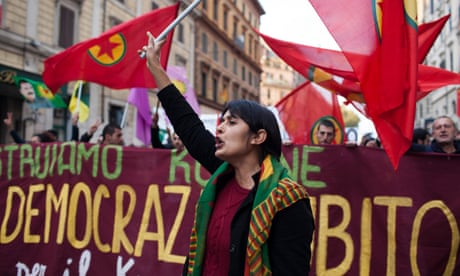
Turkey election 2015: are you voting?
Now the divisive figure of Erdoğan, accused by critics of authoritarianism, repression of his opponents and suppression of press freedom, is front and centre in polls that could put an end to what his critics say are ambitions to consolidate the power of his office and transform Turkey from a parliamentary system into a president-led republic.
“We will all have to show respect to the national will,” said Erdoğan on Sunday after voting in Istanbul. “Turkey has made great strides in democracy and this stride will be strengthened with today’s election.”
A starkly different message came from Selahattin Demirtas, the leader of the pro-Kurdish Peoples’ Democratic Party (HDP), which garnered 13% of the vote in June’s election and robbed the AKP of its majority for the first time since 2002.
“Unfortunately, it was a difficult and troubled period of election campaigning,” he said, after casting his vote. “Lives were lost. My wish is that a great hope for peace and calm emerges (from the election).”
The elections in Turkey are taking place against a backdrop of instability and renewed violence. Last month, twin suicide bombings targeted a peace rally in the capital, Ankara, killing dozens of people in the worst ever terrorist attack on Turkish soil. Another attack in the town of Suruç near the Syrian border killed 32 people, mostly Kurdish activists.
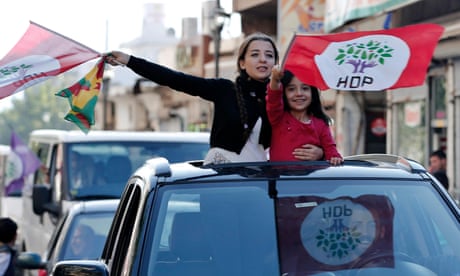
Diyarbakir prepares to vote: 'There is no joy in the runup to these elections'
The Turkish government has also cracked down on the outlawed Kurdistan Workers’ party (PKK) in recent months, suspending a peace process that aimed to pacify the long-running insurgency. Critics also say the government’s policy on Syria, which involves backing rebels fighting to overthrow the president, Bashar al-Assad, has contributed to instability.
Turkey hosts more than 2 million Syrian refugees, many of whom go on to attempt dangerous passages across the Mediterranean seeking refuge in Europe.
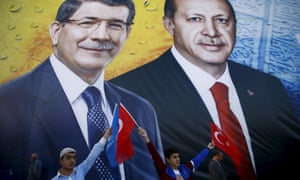
Facebook Twitter Pinterest AKP supporters wave flags in front of and billboards of Erdoğan and Davutoğlu. Photograph: Umit Bektas/Reuters
Parliamentary elections in June saw the ascendance of the HDP. Though it had won the largest share of the vote, the AKP had to try to form a coalition with its opponents. Talks foundered and Erdoğan – who opponents say had hoped the success at the polls would aid his ambition of rewriting the constitution to establish himself as an all-powerful executive president – called fresh elections.
Opponents fear that if the AKP gains additional seats in the new election it will encourage Erdoğan to further stall government formation and even to call for a third round of elections in an attempt to secure enough dominance over the legislature to form another single-party government.
The AKP’s strategy appears to be aimed at luring more nationalist heartland voters to its camp, a prospect bolstered by its crackdown on Kurdish militancy. Recent polls appear to show the only party likely to sustain significant losses in the elections is the nationalist MHP.
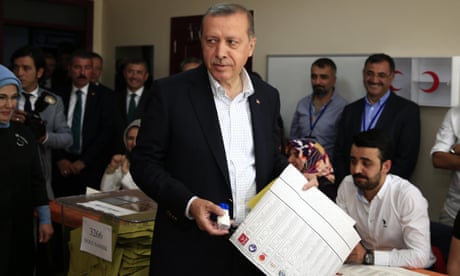
Turkey election: ruling party loses majority as pro-Kurdish HDP gains seats
“The AKP only care about their seats,” said Hasan Demir, a 26-year-old textile worker who was handing out leaflets at an HDP election tent in Istanbul. “I’m voting HDP because they are acting on behalf of everyone, not just one group of people, religion or language.”
Still, pro-AKP voters said they would back the party because they felt it was the only one capable of maintaining stability, and because its infrastructure and social development projects had lifted them out of hardship and poverty.
“I remember my mother standing for so long in lines to get medicine,” said Kadir Ulu, a 20-year-old university student when asked why he was going to vote for the AKP.
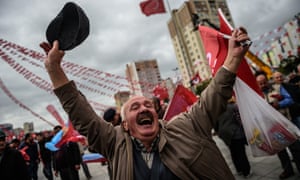




No comments:
Post a Comment